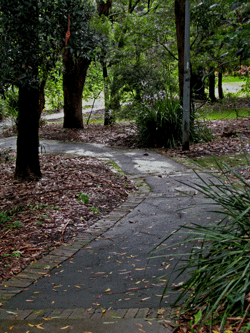My mother used to call me a slut.
One step into my bedroom and she’d cast her eyes despairingly to the ceiling and berate me for my sluttish behaviour. It wasn’t until we’d lived in Australia for several years that things changed and she would comment only on the untidiness of my room.
This was not because of any change in behaviour on my part (despite my parents’ best efforts to get me to “do something about that pigsty”) but because they’d finally worked out that the word had an entirely different meaning in this country than it had back home.
Fast forward a few years and this particular word is almost universally used primarily in the “immoral” sense.
Language, then, is important. It’s important when you’re a schoolkid trying to fit in – even if you appear to speak the same language as your peers, slightly different word choices can lead to embarrassment if not actual miscommunication – and it’s important if you’re a writer, trying to set a scene.
This time last year, I wrote a similar post on building worlds. Lately I’ve read a lot of stories set in places that are clearly foreign to the authors writing them, so I’d like to return to the theme of worldbuilding from a language perspective.
The internet has made it easy to research countries and cities, and even different industries. With enough time and effort it can be relatively straightforward to build up a fictional set of characters living in a real-world place. But picking up those subtle language differences is not so easy – and it’s not always obvious that there are differences, unless you’re looking for them.
in a real-world place. But picking up those subtle language differences is not so easy – and it’s not always obvious that there are differences, unless you’re looking for them.
The most common issue encountered in my writing/reading/editing bubble is the use of American English when a scene, its characters and even the narrator are intended to be English or Australian – and this differentiation must certainly work the other way for American readers/writers/editors.
Often, people flag footpath versus sidewalk as the most obvious writer “tell”, but there are more subtle differences of which to be aware. For example:
Once they have traversed the walkway of their choice, do your characters buy their groceries from a shop or a store? And how do they carry their shopping home – in bags or sacks?
Do they snack on biscuits or crackers? If they tuck into a packet of chips, does that mean a steaming hot bag of fries or a nice pack of crisps?
Do they take cream or milk in their tea? Or do they prefer a nice bottle of fizz? Or pop? Or just a plain old soft drink?
Where do they live? In a house or a cottage? Or perhaps they prefer a more urban lifestyle and they’ve shacked up in a flat/apartment/unit/condo…
Clothing can be a conundrum, too. If a character puts their pants on, does that mean he has his trousers on or that she’s clad in nowt but her knickers? If they’re sporting a rather fetching vest, should this include a pocket-watch adornment, or is this another word for undershirt?
Narration, as well as d ialogue, will need to fit too. Natural style for a UK or Australian speaker is usually: “come and sit down,” or “go and get your sister,” where US style is to drop the and: “come sit down, ” or “go get your sister,”* – subtle but notable differences. US style also allows for gotten and anyways, which are not typical of UK or Australian English.**
ialogue, will need to fit too. Natural style for a UK or Australian speaker is usually: “come and sit down,” or “go and get your sister,” where US style is to drop the and: “come sit down, ” or “go get your sister,”* – subtle but notable differences. US style also allows for gotten and anyways, which are not typical of UK or Australian English.**
From an editing standpoint (because we tend to check these things) this goes even further. Are any of your characters experts in their field? It’s important to not only know the language of their industry but how the experts use it – including their colloquialisms and jargon. This can be key to your story and it’s vital to note that the manner in which the public commonly uses an industry’s terms is not necessarily the way the experts wield the same words.
IT is a perfect example here, where terms are commonly misused by everyday folk and it’s easy to assume that tech experts will use the same colloquialisms, when in fact they are as precise as any doctor with their wording, even when they bandy jargon about.***
Do your research. If you’re setting your story somewhere with which you are unfamiliar, don’t just rely on the interwebs to show you where that country town is or how many Tube stops are involved in your characters’ travels. Concentrate on the language as well as the layout of your world.
If you can’t visit your intended setting, watch television shows and read books from that area – they’ll give you a good feel for dialogue and language culture. If your story is set in a specific time, be it the distant past or the present, do the same and take note of how words and language may have changed – even a couple of years can make a difference. If you’re going to write about a field or industry outside your own experience, don’t just talk to experts about their work – check that your fictional expert is using the jargon correctly, too.
The right language adds fine detail to your worldbuilding. Get it right and your reader will be an armchair traveller, mentally meandering the streets you describe with the ease and familiarity of a local (which, of course, they may well be!). Get one word wrong and they can be as easily thrown out of the story. The believability is strained, the narration rings false. If those details are wrong, thinks the reader, what else is untrustworthy in this tale?
How do you craft your language? And what words throw you out of a story?
* And yes, there’d be different punctuation here as well. I’m not entering that argument here.
** Of course there is some slipover. Americanisms and UKisms and Aussieisms cross oceans and borders with merry abandon. But unless it has been adopted into common use, an editor will likely adjust for local style. So even though, for example, “gotten” is being adopted into colloquial use in this country, it’s totes not something many editors would let pass just yet.
*** For more information on this, speak to any IT guru you know who has had to help someone fix anything on their computer. (This will be *every* IT guru you know.) Ask if you can watch next time someone asks for tech help. Marvel at the array of facial expressions deployed by said expert as they try to translate what *exactly* this person means when they say their computer is “broken” and describes the elements involved.

Leave a Reply